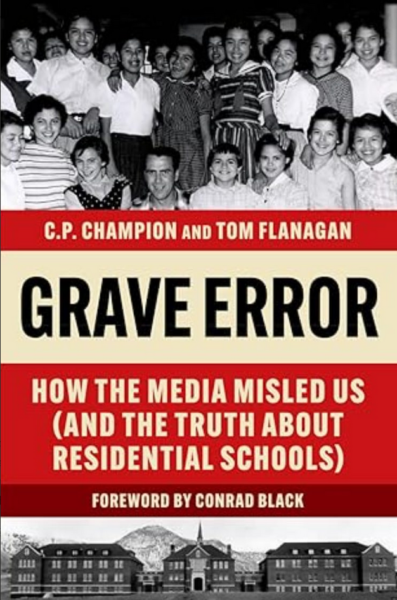In the latest SHuSH newsletter, Ken Whyte calls our attention to an important book on a major Canadian topic … that has been ignored by the Canadian media establishment (as one would expect if it contravenes the official narrative):
Have you read Grave Error? Have you seen it on the shelves in your local bookstore? At the library, perhaps? Did you notice coverage of it in the Globe or hear someone talking about it on CBC?
I’d bet ninety-eight out of a hundred SHuSH readers would answer “no” to all those questions.
The full title of the book is Grave Error: How the Media Misled Us (and the Truth About Residential Schools). Its authors are former University of Calgary political scientist and Harper aide Tom Flanagan and Chris Champion, editor of the Dorchester Review. The book takes strong exception to commentary by media, politicians, and Indigenous leaders on the subject of unmarked graves at a former Kamloops Indian Residential School. I first noticed it over the holidays, several weeks after publication, when it was the overall #1 bestseller on Amazon.
It’s not easy to become the top-selling book on Amazon. You’re competing against Colleen Hoover and Prince Harry and the entire world of books, published and self-published. Grave Error was the only Canadian book, fiction or nonfiction, in Amazon’s top fifty when I came across it. It’s rare to see more than two or three Canadian books in Amazon’s top fifty at any given time.
You won’t have noticed Grave Error in your local bookstore because Amazon is the only outlet that’s selling the book. You won’t have seen coverage of it because no mainstream Canadian media outlet has paid attention to it. Nor does any public library stock it. It has not appeared on any conventional bestseller list, although it has to be a Canadian bestseller — Amazon sells well over half of all books in Canada. Most Amazon sales don’t register on our bestseller lists because Amazon doesn’t cooperate with the organizations that produce the lists.
Grave Error is published by True North, a conservative news website and public policy organization. It is run by Candace Malcolm, who founded True North with her husband, Kaz Nejatian, a former Jason Kenney staffer, now COO of Spotify. It’s published a half dozen hits in recent years, several written by Malcolm herself.












